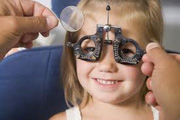Children's Eyecare
 Good vision is essential in childhood development and regular eye examinations are the key to good vision.
Good vision is essential in childhood development and regular eye examinations are the key to good vision.
Research has shown that one in five school children have an undetected eye problem. As 80% of a child’s learning occurs visually, many children cannot see well enough to reach their full potential or enjoy everyday childhood activities as much as they could.
A child may not realise if their vision is not clear – they assume the way they see is normal. Therefore regular eye examinations are advised for all children under the age of 16 at least once a year.
Typical warning signs to look out for:
1: One eye turns in, out, up or down
2: Complains of frequent headaches
3: Frequently rubs eyes or blinks a lot
4: Screws up eyes when reading or watching television
5: Avoids reading, writing or drawing
6: Has difficulty catching a ball
7: Fails to make expected progress at school
8: Develops behaviorial or concentration problems at school
Children should have their first eye examination by the age of four, sooner if any problems are suspected. The earlier a problem is detected, the more effectively it can be treated.
It doesn't matter if your child is too young to talk or read a letter chart, as we use a range of techniques and modern equipment to detect visual problems at any age.
Such equipment used is a computerised test chart which allows us to use pictures, numbers, shapes as well as letters to check the child's vision.
We provide free NHS eye tests for all children under 16 and those under 19 and in full time education. If a child is found to need spectacles, a contribution is provided by the NHS.
We stock a wide range of spectacles specially designed for children’s faces to choose from. Many have soft nose pads for extra comfort and sprung hinges to withstand extra wear and tear. So remember regular eye examinations could be crucial for your child’s health care and personal development, so don’t delay and contact us for an appointment as soon as possible.
Back Next





